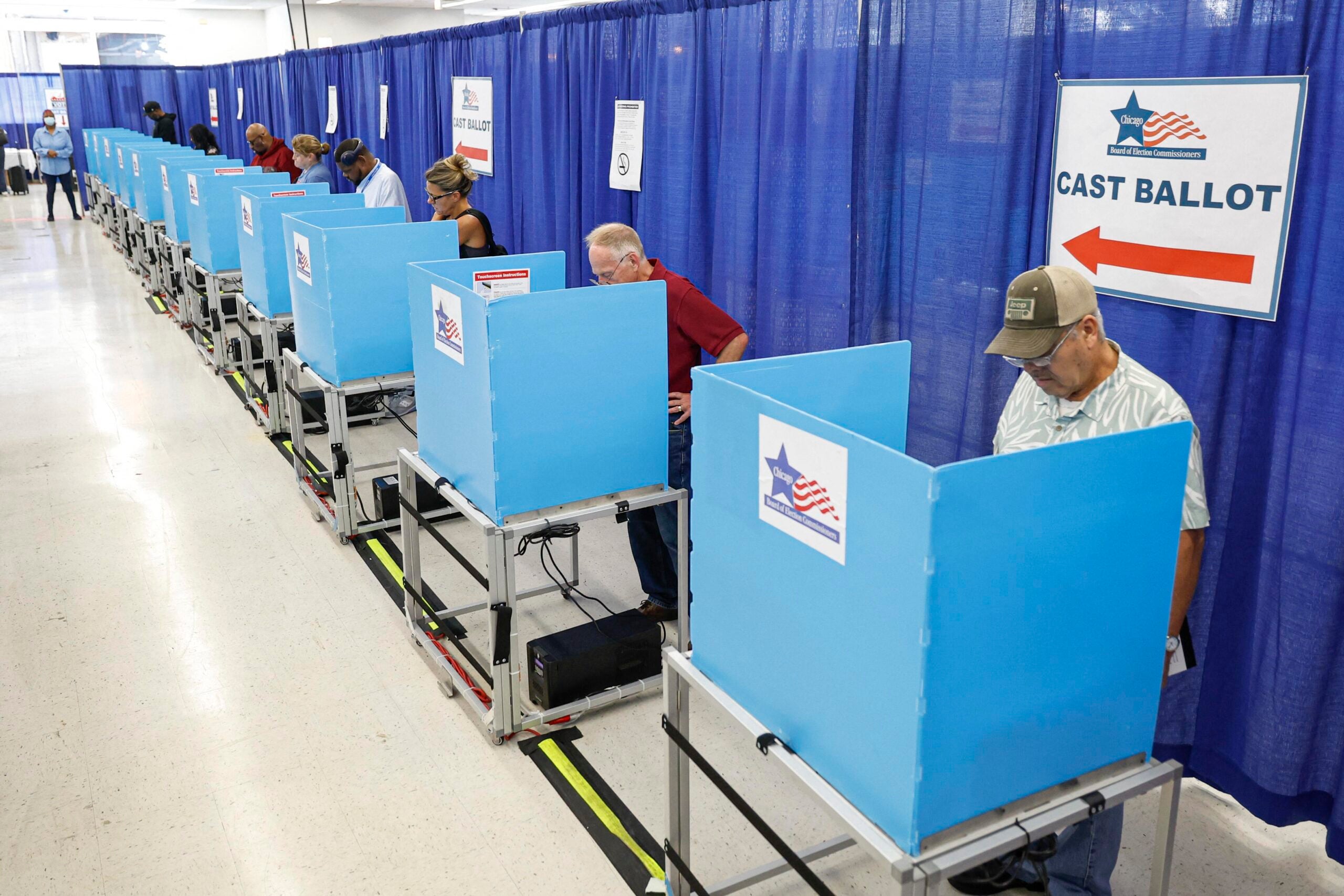On today’s edition of the Wisconsin News Roundup, we take a look at some of the most important stories of the week in our state, including news that some of the wealthiest people in Wisconsin haven’t owed state income tax for years. On Set List, Appleton band Tenement describes how unlikely influences, from Duke Ellington to Charles Ives, fit into creating the wall of sound rock songs they’re aiming for. And we find out why there seem to be so many recent court rulings on voter ID and other elections laws.
Featured in this Show
-
Poltical Science Professor Explains Recent Wave Of Overturned Voter ID Laws
The recent wave of court rulings overturning state voting laws indicates the federal court system has taken on protecting voting rights, a job that until recently was more in the purview of the the U.S. Department of Justice, according to a political science professor.
During the last two weeks, courts in five states have ruled against voter ID laws, including in Wisconsin, where a federal judge struck down parts of the state’s election rules related to early voting, time of residency and absentee ballots.
“It’s almost as if the courts are saying, ‘Well, if the Justice Department no longer has the ability to keep a close eye on what the states are doing, we, the federal courts, are going to be a guardian of that,’” said Kimi King, a political science professor at the University of North Texas.
The DOJ’s election law oversight duties were diminished with the 2013 Shelby County v. Holder Supreme Court ruling that struck down Section 4 of the Voting Rights Act, King said. That ruling essentially freed the states to enact their own election laws.
“And enact they did,” she said. “And that’s why you are now seeing all of these rulings two to three years later because it takes a while in federal court to get cases filed. It’s really the onslaught of litigation finally reaching the courts.”
Arguments about the recent cases have questioned whether the state-imposed voting laws are a necessary safeguard against voter fraud, or if they deliberately disenfranchise a group of voters in an effort to fix a virtually non-existent problem. State attorney generals had a hard time proving protection of the democratic process, while not also causing an undue burden on some voters, King said.
“The courts are looking extremely closely at the states’ interest, and they’re kind of holding them accountable if they’re unable to show sufficient evidence,” she said.
While states have the right to enact their own election laws, the federal government will always have a role to play in making sure everyone has equal access to the ballot, King said, pointing to the constitutional amendments that guaranteed voting rights to African-Americans and women.
“What has happened then, in essence, is that that right is a minimum floor that the federal government has the ability to protect,” King said. “So while the states have the ability to regulate elections, the federal government has the ability to set the floor on the minimum rights that are guaranteed. And what you are seeing here is the clash between what the floor says and what the states are allowed to do.”
-
Author: Research Links Music Taste And Personality
Musical taste is a very unique and personal thing. Some people love classic rock while others always tune into pop.
No matter the genre, music has a strong effect on the brain and the type of music people like says a lot about who individuals are, research has shown.
Psychologists concluded by the 1990s that there are five, maybe six, personality traits that can be reliably measured: conscientiousness, extroversion, agreeableness, neuroticism, openness (which can also be called cultural or intellectual), and a combination of honesty and humility. By measuring each of these characteristics, a rough approximation of an individual’s personality can be reached and then linked to music taste.
“Some psychologists have linked various personalities to various sorts of music, and to do this they had to classify music into a very small number of titles,” said John Powell, author of “How Music Works,” and “Why You Love Music: From Mozart to Metallica—The Emotional Power of Beautiful Sound.”
The musical categories are:
- Reflective and complex music: classical, folk, jazz, and blues
- Intense and rebellious music: rock, alternative, heavy metal
- Upbeat and conventional music: pop, soundtracks, religious music, and country and western
- Energetic and rhythmic music: rap, soul and electronic
“It’s been found that enthusiasts for reflective and complex music tend to score high on intelligence but they’re very poor at sports. They’re good with words and they’re often politically towards the left,” Powell said.
People who like intense and rebellious music are smart, good with words and often skilled athletes, Powell said.
There are, of course, exceptions to these categories and the associated personality traits, but the good thing is people can expand their musical tastes using these categories, the author said.
“If you like rock, you’re probably going to like alternative music as well; and if you like country and western, you’ll probably like pop music and sound tracks as well,” Powell explained.
Part of the reason music is so important to lots of people is because the brain is almost hard-wired to use music. About 3 percent of the population is tone deaf, but for everyone else music is powerful, Powell said.
“If you think about your body having a sort of internal pharmacy which dispenses various chemicals to make you run away from danger or go to sleep, then music has the key to the pharmacy,” Powell said. “It can actually help dispense these chemicals when they’re required or … if you’re having trouble sleeping for example, you’ve got too much of a chemical called noradrenaline in your system, and just listening to classical music quietly before you go to bed can stop that problem and cure insomnia.”
-
State News Roundup For August 5, 2016
Milwaukee County Executive Chris Abele hasn’t paid any state income tax since 2000…and he’s not the only wealthy Wisconsinite who doesn’t owe income tax. A news editor joins us to talk about this story and other top stories from around Wisconsin this week.
-
Appleton's Tenement Are Students Of Structure On A Singular Musical Path
In 2015 the Appleton band Tenement released a 25-song, 80-minute album that, although anchored with a pop-punk backbone, mixed up punk with jazz explorations and caught wide critical acclaim from Rolling Stone to Pitchfork.
Led by singer and guitarist Amos Pitsch, the band recently stopped by the WPR studio to play songs and describe how unlikely influences, from Duke Ellington to Charles Ives, fit into creating the wall of sound rock songs they’re aiming for.
Video highlights and audio of the band’s entire performance in WPR’s Buck studio.
-
Why Courts Around The Country Are Ruling Against Election Laws
In the last two weeks, five courts in five states have ruled against voter ID laws. We talk to a political scientist about the spike in rulings on voter laws just a few months before the general election.
Episode Credits
- Rob Ferrett Host
- Veronica Rueckert Host
- Haleema Shah Producer
- Judith Siers-Poisson Producer
- Amanda Magnus Producer
- Karl Christenson Producer
- Kimi King Guest
- John Powell Guest
- Rob Mentzer Guest
- Tenement Guest
Wisconsin Public Radio, © Copyright 2024, Board of Regents of the University of Wisconsin System and Wisconsin Educational Communications Board.





